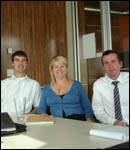
The Facilities Group 1. What are your past jobs and experiences? a. All three of them worked in a biology lab at UW and have experience with working on the bench. They emphasized that their lab experience helped them communicate with and understand the scientists that they worked with and break the gap between the needs of research and their facilities. 2. What are your job responsibilities? a. Becky works in the operation section of Facilities. She deals with reception, archiving, shipping and receiving and more. She does budgeting, grant regulations, and deciding what business/vendors to use. Steve is in charge of Facilities Services. He works with the building itself, dealing with things such as equipment, furniture, and heating and cooling. Sean is responsible for many different things especially core facilities. For example, real estate aspects, facility needs, tenants, contracts, financials, etc. b. “The motto is very customer service. You’re tending to lots of needs. A lot of those, you may have encountered these situations before or you may not have. You kind of deal with or come up with solutions that fit the need… You’re putting out a lot of fires all day long.” c. Seventy-five percent of Sean’s time is spent in meetings. He answers Becky and Steve’s questions, solving issues, and supporting the department. d. When a new employee comes to ISB, it’s Facilities that issues them a key card, organizes their seating and telephone, and does the employee’s safety orientation. 3. What is a day like in your position? a. The day starts off fairly routine but soon branches off and can be very diverse and unique each day. They might start off checking some emails and making sure things like the H-Vac are in order (Steve). Afterwards, they have to be prepared to deal with a variety of situations and solve problems that come up. There are also a lot of meetings and they have to always checking their emails and on alert. 4. Do you think it’s necessary to have a science background to work in Facilities? a. No, but having some science background can be helpful. It is very useful when working with scientists to know the jargon and having a little science background can help a lot. 5. What do you like about this job that is different from bench work at a lab? a. Steve said that he enjoyed the “instant gratification” from fixing equipment like air handlers right away. b. Becky liked the curiosity and excitement from a science environment. She enjoys being apart of a variety of projects rather than doing bench work. c. “With Facilities, you’re trying to proactive and making assumptions. You’re basically forcasting a problem that may come up in the future or when you’re doing a lot of hands on things it’s like you’re dealing with a network. ‘Why isn’t this thing working whether it’s a piece of instrumentation or process and you start to dive into that just like doing networking. You’ll knock out one piece of it and see what happens after that. A lot of the problem solving is the same stuff that we deal with.” Sean said. 6. Is there always going to be a Facilities Department in a research institute? a. Yes, but it may be set up differently. “It’s unique, it’s not your typical office, typical commercial business. It’s very specialized, when you’re dealing with an institute that is to be grant funded, you’re dealing with a different animal all together.” b. Being a part of a grant-funded research institute, the Facilities Department has to be conservative and comply with money regulations. 7. How is the Facilities Department at ISB different from that of other research facilities? a. The culture of ISB is different from other research institutes. “People are communicating with each other or at least bumping in with each other. Instead of just being hidden away... You have a little bit of flexibility without a true board structure things organizationally a little different but you do have regulation on how you can run the business as a non-profit.” b. “We tried to design the building to help impact the culture. If you take this building or even 1441. If you look at the areas of the building that have the great views and the water, you’ll notice that there’s no offices. Lee Hood’s office does not have the best view of the whole entire institute. We decided to leave that open so everybody could enjoy that.” 8. How much percent of the money goes into Facilities? a. Facilities takes the largest portion of money in administration because it needs the most resources to operate. “The facilities and operations budget is the largest out of all the administration groups it takes the most resources to operate.” 9. What is the most interesting aspect of your job? a. “I think the most interesting aspect of my job is the amount of questions and the amount of responsibilities that I have… I don’t know all the problems there are going to be. It’s just problem solving different issues daily.” 10. What would you say is the most challenging part of your job? a. “I would say the most challenging part is not always knowing what you are going to run into. No matter how much planning or preparation you put, you’ll always run into things that are not accounted for.” b. “You can go home at five, but it’s not over. The AC could switch off at two in the morning and you’re responsible for it. It’s a 24/7 job.” c. Making visions come true while working with the resources at hand and the limitations they place. |
|
Any opinions, findings, and conclusions or recommendations expressed in this material are those of the author(s) and do not necessarily reflect the views of the National Science Foundation. Institute for Systems Biology, 1441 North 34th Street, Seattle, WA 98103-8904 |